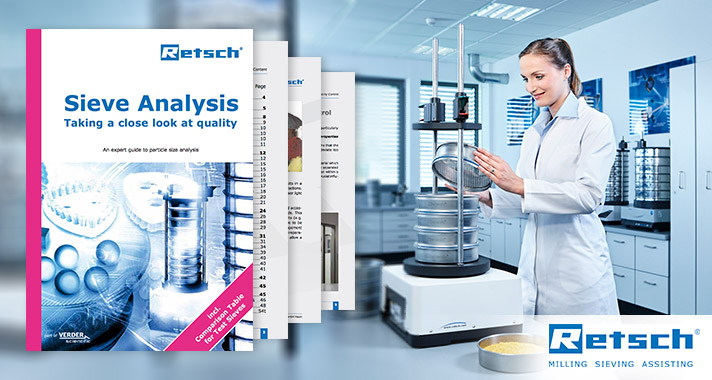Retsch’s 56 pp Expert Guide to particle size analysis is available free of charge in printed form on request. The digital version can be downloaded from our website.
Written by specialists it describes in detail sieving methods and analysis procedures, such as sampling, sieve selection, wet sieving and more. A chapter explains evaluation and interpretation of results and another elucidates the secrets behind digital image analysis.
I strongly recommend this Expert Guide to everybody involved in particle analysis. Order a printed copy free of charge or download the guide from our website.
Excerpt from the guide: “… Some examples taken from everyday life show how closely the particle size distribution is linked with product properties:
If the particles of ground filter coffee are too coarse, the contained flavors cannot dissolve completely in hot water. This is due to the fact that only the flavors contained in the particle surface are washed out. Thus, the taste of the coffee cannot fully develop. Moreover, the water runs too quickly through the spaces between the particles and the filter. If the coffee is ground too fine, too many flavours, acids and bitter aromas are dissolved which impair the taste. Another disadvantage is the blocking of the fine-pored filter paper by ultra-fine particles which can even cause overflowing of the filter.
Abrasive papers and grinding pastes need abrasive agents with a very narrow particle size distribution. Consequently, the particle sizes should not vary too much. Substantial deviations from the required size range may result in uneven surfaces: if the particles are too coarse, the paper/paste can leave deep grooves in the treated surface; if the particles are too fine, the grinding effect is reduced.
Activated carbon filters in respiratory masks need a large reaction surface to efficiently absorb hazardous organic solvents from the air. The surface area is particularly influenced by the particle size. If the particles in the filter are too coarse, an efficient neutralization of the harmful vapors is not possible. If the particles are too fine, the person wearing the mask will have difficulties to breathe because the fine pores prevent sufficient amounts of air from passing…









